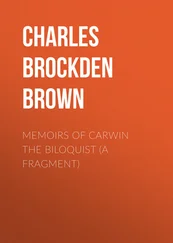Charles Brown - Edgar Huntly; or, Memoirs of a Sleep-Walker
Здесь есть возможность читать онлайн «Charles Brown - Edgar Huntly; or, Memoirs of a Sleep-Walker» — ознакомительный отрывок электронной книги совершенно бесплатно, а после прочтения отрывка купить полную версию. В некоторых случаях можно слушать аудио, скачать через торрент в формате fb2 и присутствует краткое содержание. Жанр: foreign_prose, foreign_antique, на английском языке. Описание произведения, (предисловие) а так же отзывы посетителей доступны на портале библиотеки ЛибКат.
- Название:Edgar Huntly; or, Memoirs of a Sleep-Walker
- Автор:
- Жанр:
- Год:неизвестен
- ISBN:нет данных
- Рейтинг книги:4 / 5. Голосов: 1
-
Избранное:Добавить в избранное
- Отзывы:
-
Ваша оценка:
- 80
- 1
- 2
- 3
- 4
- 5
Edgar Huntly; or, Memoirs of a Sleep-Walker: краткое содержание, описание и аннотация
Предлагаем к чтению аннотацию, описание, краткое содержание или предисловие (зависит от того, что написал сам автор книги «Edgar Huntly; or, Memoirs of a Sleep-Walker»). Если вы не нашли необходимую информацию о книге — напишите в комментариях, мы постараемся отыскать её.
Edgar Huntly; or, Memoirs of a Sleep-Walker — читать онлайн ознакомительный отрывок
Ниже представлен текст книги, разбитый по страницам. Система сохранения места последней прочитанной страницы, позволяет с удобством читать онлайн бесплатно книгу «Edgar Huntly; or, Memoirs of a Sleep-Walker», без необходимости каждый раз заново искать на чём Вы остановились. Поставьте закладку, и сможете в любой момент перейти на страницу, на которой закончили чтение.
Интервал:
Закладка:
I could form no stable resolutions. I seemed unalterably convinced of the necessity of separation, and yet could not execute my design. When I had wrought up my mind to the intention of explaining myself on the next interview, when the next interview took place my tongue was powerless. I admitted any excuse for postponing my design, and gladly admitted any topic, however foreign to my purpose.
It must not be imagined that my health sustained no injury from this conflict of my passions. My patroness perceived this alteration. She inquired with the most affectionate solicitude into the cause. It could not be explained. I could safely make light of it, and represented it as something which would probably disappear of itself, as it originated without any adequate cause. She was obliged to acquiesce in my imperfect account.
Day after day passed in this state of fluctuation. I was conscious of the dangers of delay, and that procrastination, without rendering the task less necessary, augmented its difficulties. At length, summoning my resolution, I demanded an audience. She received me with her usual affability. Common topics were started; but she saw the confusion and trepidation of my thoughts, and quickly relinquished them. She then noticed to me what she had observed, and mentioned the anxiety which these appearances had given her She reminded me of the maternal regard which she had always manifested towards me, and appealed to my own heart whether any thing could be said in vindication of that reserve with which I had lately treated her, and urged me, as I valued her good opinion, to explain the cause of a dejection that was too visible .
To all this I could make but one answer:–"Think me not, madam, perverse or ungrateful. I came just now to apprize you of a resolution that I had formed. I cannot explain the motives that induce me. In this case, to lie to you would be unpardonable, and, since I cannot assign my true motives, I will not mislead you by false representations. I came to inform you of my intention to leave your service, and to retire, with the fruits of your bounty, to my native village, where I shall spend my life, I hope, in peace."
Her surprise at this declaration was beyond measure. She could not believe her ears. She had not heard me rightly. She compelled me to repeat it. Still I was jesting. I could not possibly mean what my words imported.
I assured her, in terms still more explicit, that my resolution was taken and was unalterable, and again entreated her to spare me the task of assigning my motives.
This was a strange determination. What could be the grounds of this new scheme? What could be the necessity of hiding them from her? This mystery was not to be endured. She could by no means away with it. She thought it hard that I should abandon her at this time, when she stood in particular need of my assistance and advice. She would refuse nothing to make my situation eligible. I had only to point out where she was deficient in her treatment of me, and she would endeavour to supply it. She was willing to augment my emoluments in any degree that I desired. She could not think of parting with me; but, at any rate, she must be informed of my motives.
"It is a hard task," answered I, "that I have imposed upon myself. I foresaw its difficulties, and this foresight has hitherto prevented me from undertaking it; but the necessity by which I am impelled will no longer be withstood. I am determined to go; but to say why is impossible. I hope I shall not bring upon myself the imputation of ingratitude; but this imputation, more intolerable than any other, must be borne, if it cannot be avoided but by this disclosure.
"Keep your motives to yourself," said she. "I have too good an opinion of you to suppose that you would practise concealment without good reason. I merely desire you to remain where you are. Since you will not tell me why you take up this new scheme, I can only say that it is impossible there should be any advantage in this scheme. I will not hear of it, I tell you. Therefore, submit to my decree with a good grace."
Notwithstanding this prohibition, I persisted in declaring that my determination was fixed, and that the motives that governed me would allow of no alternative.
"So, you will go, will you, whether I will or no? I have no power to detain you? You will regard nothing that I can say?"
"Believe me, madam, no resolution ever was formed after a more vehement struggle. If my motives were known, you would not only cease to oppose, but would hasten, my departure. Honour me so far with your good opinion as to believe that, in saying this, I say nothing but the truth, and render my duty less burdensome by cheerfully acquiescing in its dictates."
"I would," replied the lady, "I could find somebody that has more power over you than I have. Whom shall I call in to aid me in this arduous task?"
"Nay, dear madam, if I can resist your entreaties, surely no other can hope to succeed."
"I am not sure of that," said my friend, archly; "there is one person in the world whose supplications, I greatly suspect, you would not withstand."
"Whom do you mean?" said I, in some trepidation.
"You will know presently. Unless I can prevail upon you, I shall be obliged to call for assistance."
"Spare me the pain of repeating that no power on earth can change my resolution."
"That's a fib," she rejoined, with increased archness. "You know it is. If a certain person entreat you to stay, you will easily comply. I see I cannot hope to prevail by my own strength. That is a mortifying consideration: but we must not part; that is a point settled. If nothing else will do, I must go and fetch my advocate. Stay here a moment."
I had scarcely time to breathe, before she returned, leading in Clarice. I did not yet comprehend the meaning of this ceremony. The lady was overwhelmed with sweet confusion. Averted eyes and reluctant steps might have explained to me the purpose of this meeting, if I had believed that purpose to be possible. I felt the necessity of new fortitude, and struggled to recollect the motives that had hitherto sustained me.
"There!" said my patroness; "I have been endeavouring to persuade this young man to live with us a little longer. He is determined, it seems, to change his abode. He will not tell why, and I do not care to know, unless I could show his reasons to be groundless. I have merely remonstrated with him on the folly of his scheme, but he has proved refractory to all I can say. Perhaps your efforts may meet with better success."
Clarice said not a word. My own embarrassment equally disabled me from speaking. Regarding us both, for some time, with a benign aspect, Mrs. Lorimer resumed, taking a hand of each and joining them together:–
"I very well know what it was that suggested this scheme. It is strange that you should suppose me so careless an observer as not to note, or not to understand, your situation. I am as well acquainted with what is passing in your heart as you yourself are: but why are you so anxious to conceal it? You know less of the adventurousness of love than I should have suspected. But I will not trifle with your feelings.
"You, Clithero, know the wishes that I once cherished. I had hoped that my son would have found, in this darling child, an object worthy of his choice, and that my girl would have preferred him to all others. But I have long since discovered that this could not be. They are nowise suited to each other. There is one thing in the next place desirable, and now my wishes are accomplished. I see that you love each other; and never, in my opinion, was a passion more rational and just. I should think myself the worst of beings if I did not contribute all in my power to your happiness. There is not the shadow of objection to your union. I know your scruples, Clithero, and am sorry to see that you harbour them for a moment. Nothing is more unworthy of your good sense.
Читать дальшеИнтервал:
Закладка:
Похожие книги на «Edgar Huntly; or, Memoirs of a Sleep-Walker»
Представляем Вашему вниманию похожие книги на «Edgar Huntly; or, Memoirs of a Sleep-Walker» списком для выбора. Мы отобрали схожую по названию и смыслу литературу в надежде предоставить читателям больше вариантов отыскать новые, интересные, ещё непрочитанные произведения.
Обсуждение, отзывы о книге «Edgar Huntly; or, Memoirs of a Sleep-Walker» и просто собственные мнения читателей. Оставьте ваши комментарии, напишите, что Вы думаете о произведении, его смысле или главных героях. Укажите что конкретно понравилось, а что нет, и почему Вы так считаете.












